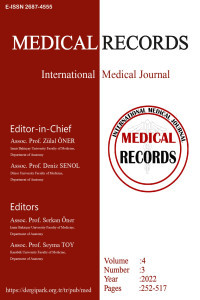Yeni Doğanlarda Hamile Obezitesinin Etkileri
Gebelik, obezite, vücut kitle indeksi, yenidoğan
The Effects of Pregnant Obesity in Newborn
Pregnancy, Obesity, Body mass index, Newborn,
___
- 1. AuneD, Saugstad OD, Henriksen T, Tonstad S. Maternal bodymassindex and theriskof fetal death,stillbirth, and infant death: a systematic review and meta-analysis. JAMA 2014; 311:1536.
- 2. İrge E, Timur S, Zincir H, Oltuluoğlu H, Dursun S. Gebelikte beslenmenin değerlendirilmesi. STED 2005;14(7):157–60.
- Yayın Aralığı: Yılda 3 Sayı
- Başlangıç: 2019
- Yayıncı: Zülal ÖNER
Böbreküstü Bezinde HMGB1 ile Obezite İlişkisinin Araştırılması
Muhammed ERDAL, Zuhal ALTUNKAYNAK, Adem KOCAMAN, İşınsu ALKAN, Emin ÖZTAŞ
Diyabetik Retinopatili Hastalarda Vitreus Mizah Değişikliklerinin Difüzyon MRG ile Değerlendirilmesi
Çiğdem BAYRAM, Aysegul YETKİN, Atilla TEKİN
Pandemi Sürecinde Bulunmanin Benign Paroksismal Pozisyonel Vertigo İle İlişkisi Var Mı?
Şerif Şamil KAHRAMAN, Fatih YÜCEDAĞ
Kalp Hastalıklarına İlişkin Risk Faktörlerinin Multilayer Perceptron Modeli ile Tahmini
Mehmet GUNATA, Ahmet Kadir ARSLAN, Cemil ÇOLAK, Hakan PARLAKPINAR
Yeni Doğanlarda Hamile Obezitesinin Etkileri
Nurten KOÇAK, Suleyman ERSOY, Emin PALA
Esra GÜNEY, Esra KARATAŞ OKYAY, Tuba UÇAR
Türk Populasyonunda Üst Ve Alt Ekstremite Uzun Kemiklerinde Foramen Nutricium’larin İncelenmesi
Kenan ÖZTÜRK, Ahmet DURSUN, Mehtap AYAZOĞLU, Yadigar KASTAMONİ
Genomik Biyobelirteçleri Belirleyerek Yapay Zeka Tabanlı Kolon Kanseri Tahmini
